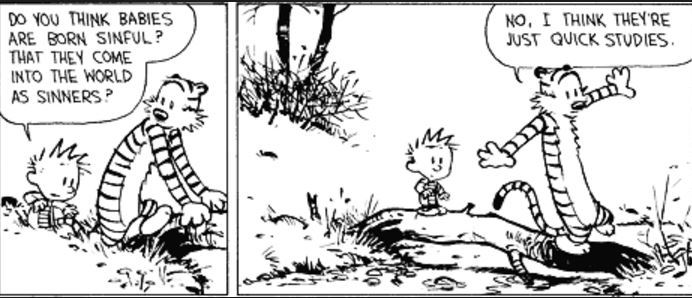|
Word Gems
exploring self-realization, sacred personhood, and full humanity
Editor's 1-Minute Essay:
Sin
return to "Sin" main-page
|
John Fogerty
Moody River
last Saturday evening, I came to the old oak tree,
stands beside the river, where you were to meet me,
on the ground your glove I found, with a note addressed to me,
“dear love, I've done you wrong, now I must set you free,
no longer can I live, with this hurt and this sin,
I just couldn't tell you, that guy was just a friend”
I looked into the muddy water and what could I see,
I saw a lonely, lonely face just looking back at me,
tears in his eyes and a prayer on his lips,
and the glove of his lost love was at his fingertips…
|

|
Editor’s Prefatory Comment:
Word Gems writings dealing with subjects of religious overtone are difficult to approach.
The problem, essentially, becomes one of surmounting disinformation campaign. Topics such as sin, hell, guilt and others have been commandeered by Big Religion in an effort to psychologically enslave people. Virtually everything you’ve ever heard about these subjects is not true.
Allow me to begin this writing by stating forthrightly – there’s nothing for you to worry about. The universe is not constructed upon principles of punishment and condemnation, but only education.
This doesn't mean that those who live selfish lives escape any accountability. We are held strictly responsible for all that we do. Held responsible by whom? - no external source but by one's own higher self, which is not so easy to please. But the good news is that we, ourselves, control the process of remediation. And for those who desire to change for the better, there's absolutely nothing to worry about.
We’ll discuss this at length.
|
"Whatever weakens your reason, impairs the tenderness of your conscience, obscures your sense of God, takes off your relish for spiritual things, whatever increases the authority of the body over the mind, that thing is sin to you, however innocent it may seem in itself." Susana Wesley
I've long admired Susana Wesley's very wise statement on the subject of "sin."
However, it's best that we employ another term to express her sentiment as the word "sin" suffers terribly having been laden with oppressive burdens, nearly 2000 years of untoward religious dogma -- far too much baggage.
 coming to terms
A good way to begin our discussion will be to address word origins:
coming to terms
A good way to begin our discussion will be to address word origins:
sin (n.)
Old English synn "moral wrongdoing, injury, mischief, enmity, feud, guilt, crime, offense against God, misdeed," from Proto-Germanic *sun(d)jo- "sin" (source also of Old Saxon sundia, Old Frisian sende, Middle Dutch sonde, Dutch zonde, German Sünde "sin, transgression, trespass, offense," extended forms), probably ultimately "it is true," i.e. "the sin is real" (compare Gothic sonjis, Old Norse sannr "true"), from PIE *snt-ya-, a collective form from *es-ont- "becoming," present participle of root *es- "to be." See is.
The semantic development is via notion of "to be truly the one (who is guilty)," as in Old Norse phrase verð sannr at "be found guilty of," and the use of the phrase "it is being" in Hittite confessional formula. The same process probably yielded the Latin word sons (genitive sontis) "guilty, criminal" from present participle of sum, esse "to be, that which is." Some etymologists believe the Germanic word was an early borrowing directly from the Latin genitive. See sooth.
(from www.etymonline.com)
Our modern term "sin" derives from a family of words exhibiting the core idea of "to be." We see evidence of this root-meaning as related words in this family of terms denote that which is "real" and "true," and these have no taint of any notion of guilt. This was added later. For example, the basic verb "is" comes from this family; or the Old English word "sooth," which means "truth" - as in Shakespeare's "forsooth," that is, "for certain" or "for sure" - is part of the family of words that gave us "sin." Both "is" and "sooth" share the core meaning of "to be" but each is miles away from any concept of "guilt."
We shall not be surprised to find Big Religion having reconfigured "sin," a neutral word of "being," to reflect dark anti-humanistic teachings. Over the centuries, a simple precept of "to be" was sullied by editorial comment to include not just "I am" but "I am guilty, a bad person; my very existence, my claim to being, is colored by bad things I've done, and bad family heritage extending all the way back to Adam and Eve."
Holy Mother Cult degraded a neutral concept, re-engineered it in the service of making you feel no-good and inadequate. This is what cults do in order to tighten the screws of psychological control. There is a wide chasm between "I am" and "I am guilty," but Big Religion managed to bridge the gap.
|
more than drinking the koolaid
The long reach of cultism encompasses much more than crackpot churches. The root idea of cult offers the sense of "cut." This core concept of "cut" leads us to images of refinement and refashioning and, by extension, development, control, pattern, order, and system.
Cultism as systemization finds a ready home in religion and philosophy which seek to regulate and redistill the patterning and ordering of ideas. However, in a larger sense, the spirit of cultism extends to every facet of society. We find it scheming and sedulously at work in politics, academia, family, corporations, entertainment, science, artistry – anywhere power might be gained by capturing credulous and fear-based minds.
See the “cultism” page for a full discussion.

|
People do bad things all the time, no surprise here, but there is monumental existential difference between one's actions and the creation of a checkered identity. Just because people do bad things doesn't mean that their essential selves have been defined by what they do. It doesn't work that way.
"Holy Mother Church," in her relentless efforts to try to convince you that you are no good, can be counted on to slant the story against you.
missing the mark
See my article on "Evil" for an in-depth discussion regarding the nature of dark things of this world. We will find that "evil" is just the good turned inside out; it has no substance per se, but is merely the illicit shadow of the good, a short-cut to the good that unwise people take.
It's all part of being spiritually young and immature, something every human being will put to the test. But should we expect otherwise from kids who have no life-experience?
Eating of the tree of the knowledge of good and evil is our required path to wisdom. It gives us depth of understanding, just an aspect of growing up. There can be no other way. It's a primary reason why we came to this world. There was no "fall" in the mythical Garden of Eden, but only a coming of age, a stumbling into greater sentience via suffering.
"Holy Mother Church," recasting a normal evolutionary path, seeks to condemn as "hopeless sinners" the babies, we might say, who spill cups of milk at the dinner table. But it was Jesus himself who said that the spiritually immature "know not what they do." Sounds like incoherent babies to me. Lawyers would call "know not what they do" as "lack of capacity" to be held culpable for misdeed.
Let us state the obvious that babies don't make themselves, they are not responsible for their essential natures, nor did they invent their own proclivities for eating apples and spilling milk. I believe it was philosopher David Hume who said, if we were geese, we would see the world differently as our morality (in part) is constitutive of biology, it's in our gut; and if playing the blame-game were appropriate here, we would need to instruct the jury to well consider the alleged competence of the Maker, also a party to the babies' so-called unskilfullness and innate desires - but all of this is too logical and, to our discussion, just more nonsense.
There is no culpability in "know not what they do"; yes, there will be personal suffering, for sure, in any ill-advised action, which is part of the natural educative lesson-plan - but there is no cosmic, heavy-handed condemnation. Such diatribe is just pious propaganda, designed to keep you co-dependent with fear and guilt.
 I'll bet he eats shiny red apples when you said not to, as well.
The primary New Testament Greek word for sin was borrowed from common parlance of ancient society and simply means "missing the mark." It was used for archers with their target practice.
I'll bet he eats shiny red apples when you said not to, as well.
The primary New Testament Greek word for sin was borrowed from common parlance of ancient society and simply means "missing the mark." It was used for archers with their target practice.
 The original Greek for "sin" carries not a particle of condemnation or sense of guilt for those who do not hit the target; nor for those who spill milk or eat apples.
The original Greek for "sin" carries not a particle of condemnation or sense of guilt for those who do not hit the target; nor for those who spill milk or eat apples.
 it's alright, little baby, it was just your "practice turn"
And there's no condemnation even if the babies jolly-well mean to spill the milk, and work very hard to do so...
it's alright, little baby, it was just your "practice turn"
And there's no condemnation even if the babies jolly-well mean to spill the milk, and work very hard to do so...
 and he's not even sorry (smile)
I will tell you something that might sound extreme - but, if I may be allowed to assert, my words sound severe but only to those who have not invested decades of study, nor decades of teaching-experience working in "the Church." The fact of the matter is, it is difficult for me to think of one single concept that "the Church" has not corrupted and bent out of shape in its sleight-of-hand efforts to make merchandize of people. Not one. Everything coming from them has a certain smell to it, one of private agenda - but not for your benefit.
Every idea Big Religion promotes is somehow stained, off kilter, muddied, to some degree or another. And the contrived definition of "sin" is but one more testimony to Despotic Ecclesia's efforts at power-and-control. Her doctrines - reflecting, in the main, the dark views of the butcher Constantine - are designed with one goal in mind: to foster a sense of fear and guilt, thereby keeping "the sheep" dependent, intimidated, and servile. When Roman broad-swords went out of style, they opted for the more-portable psychological warfare.
no condemnation, no concept of sin, in Summerland
Summerland society is spiritual, not religious; it's all very progressive in that "real world" with much emphasis on education and personal development. There is no judgment throne over there, no tallying-up of credits and debits, no external authority to condemn for any lack of "measuring up." There is no punishment for anything. There are "places of detention" where people are required to slow down and think about their lives and what they want to do next, but there is no condemnation. Traditional "churchianity" concepts of "sin" have no place in Summerland and are summarily discarded as useless vestiges of the darkness and superstitions of the Earth.
My purpose in presenting this page is to lighten your burden. There is nothing to fear about crossing over, nor anything to dread about the future. You don't have to be perfect to start your "real life" in Summerland. All you need is a willing heart to do your best, and you're good to go. Consider this wonderful channeled information:
and he's not even sorry (smile)
I will tell you something that might sound extreme - but, if I may be allowed to assert, my words sound severe but only to those who have not invested decades of study, nor decades of teaching-experience working in "the Church." The fact of the matter is, it is difficult for me to think of one single concept that "the Church" has not corrupted and bent out of shape in its sleight-of-hand efforts to make merchandize of people. Not one. Everything coming from them has a certain smell to it, one of private agenda - but not for your benefit.
Every idea Big Religion promotes is somehow stained, off kilter, muddied, to some degree or another. And the contrived definition of "sin" is but one more testimony to Despotic Ecclesia's efforts at power-and-control. Her doctrines - reflecting, in the main, the dark views of the butcher Constantine - are designed with one goal in mind: to foster a sense of fear and guilt, thereby keeping "the sheep" dependent, intimidated, and servile. When Roman broad-swords went out of style, they opted for the more-portable psychological warfare.
no condemnation, no concept of sin, in Summerland
Summerland society is spiritual, not religious; it's all very progressive in that "real world" with much emphasis on education and personal development. There is no judgment throne over there, no tallying-up of credits and debits, no external authority to condemn for any lack of "measuring up." There is no punishment for anything. There are "places of detention" where people are required to slow down and think about their lives and what they want to do next, but there is no condemnation. Traditional "churchianity" concepts of "sin" have no place in Summerland and are summarily discarded as useless vestiges of the darkness and superstitions of the Earth.
My purpose in presenting this page is to lighten your burden. There is nothing to fear about crossing over, nor anything to dread about the future. You don't have to be perfect to start your "real life" in Summerland. All you need is a willing heart to do your best, and you're good to go. Consider this wonderful channeled information:
|
Two Years In Heaven, Dr. C.H. Carson, from his wife Rose, her experiences in the afterlife:
"My mind is filled with plans of what I hope to do. How glorious it will be to enter into active work and to realize that whatever I set out to do I shall be able to accomplish through the efforts I make! It seems good to be alive; to feel so well and strong that one’s whole being vibrates with new and wonderful life…
"Every moment of the time I spent in spirit life was occupied with something helpful and instructive… [to] furnish me with some helpful idea that I could impart to others to aid them in their progress toward higher, grander, and better things...
"My soul is alive and vibrant with plans for the future, and I am happy and more glad of life as each day passes, not for myself alone, but for those who are to follow after me and whom my influence is to lead heavenward... The consciousness that I have attained tells me this great truth: The soul aspiring for progress never retrogrades; it goes on and on, throughout all eternity, toward greater achievements and higher realizations."
Editor's note: I love this writing - so positive, so encouraging. And we thank Rose for the clear statements: no retrograding, no going backwards; meaning, no reincarnation.
How infectious is the joy and enthusiasm of this lady - her "soul ... alive and vibrant with plans for the future." Is this not the mind-set of The Great Teacher, as expressed in Mark 11?
'mountain moving' talk at its best
And look at her supreme confidence: "whatever I set out to do I shall be able to accomplish." Is this not "mountain-moving" talk at its best? How "good" she says, "to be alive." What a wonderful example of "embrace this God-life, really embrace it."
READ MORE in the Mark 11 article.
|
Doctor, Doctor!
There is no such thing as "sin" - not in the way they teach it; of course, we know that people "miss the mark" all the time, they do bad and stupid things every day - but this is just part of the education process. Babies are not known for their sagacity.
There is an old joke, "Doctor, Doctor, it hurts when I do that!" - "Don't do that!"
When we "miss the mark" we will find that suffering is the natural consequence, the perfect teacher informing us, "Don't do that!" It's quite unnecessary for some imaginary sky-god on a big throne to punish us, as we do such a grand job of it ourselves.
We purposefully came to a world of clashing, dualistic opposites in order to "wake up," to gain depth of wisdom and understanding about the nature of life and love. We could not appreciate the "warm" without the "cold"; we would never know the meaning of dark without light; up has no relevance without down; and the good would ever remain a vague theoretical notion without us having stumbled and wept in the valley of sorrow and pain. Tuition, as they say, is expensive.
the essence of 'sin' is not blame and guilt - but insanity
As Jesus said, "they know not what they do!" - they're insane.
Yes, there is no such thing as "sin" - not in the way they teach it. But there is plenty of spiritual immaturity and insanity to go around; however, these are conditions from which we shall yet find remedy and healing. No thanks to "Holy Mother Church."
Some parents are just abusive and dysfunctional, and we need to divorce ourselves from them.
 good job! - and she did it all by herself
good job! - and she did it all by herself
Spirit Guide Abu discusses "sin" and "guilt"
Editor’s note: The following discussion on “sin” and “guilt” is from Spirit Guide Abu, 3500 years on the other side, who spoke through trance-medium Rick Rickard during the 1950s. Abu's testimony was tape-recorded and transcribed, posted in the book, “Abu Talks, Volume One,” chapter three.
While Abu had spoken on these topics before, a lady in the group continued to have unresolved issues with “sin” and “guilt” and asked for further clarification.
Editor’s note: Teacher Abu’s response to the lady I count as very sensitively offered. He lays down no law. He speaks empathetically as an older brother who’s trodden the same path as anyone else. His qualification as a teacher is to have explored these universal issues as an advance-guard.
Abu: He says that the nettlesome topics of sin and guilt find their shadowy substance in a misunderstanding of one’s own status before God. He says the key to resolution here is to “come into a relationship with” oneself: “I would venture to say ... even particularly educated mankind is in fact in no sense really in a true relationship with itself.” He said this is so because mankind’s “own ego” is “smothered, is overlaid by accretions, by ideas and by notions, which have slowly grown up over the centuries,” and this concept of ego has become known as mankind’s “second nature.”
Editor’s note: In his own words, without popular terminology, Abu explains the important concepts of sin, guilt, the dysfunctional ego, the false self, and the true self. If I may suggest, I recognize that he, indeed, does understand the deeper meanings of these concepts because I, too, have experienced the better definitions, and therefore I find great authenticity in the Spirit Guide’s teaching here.
Abu: “Man has generally refused to enter into true relationship with himself.” He says that this “relationship” consists of a correspondence between “the conscious thinking part of the mind of man” and “the greater part of the mind of man.” This is “the relationship which is vitally important, and if [mankind] shall arrive at a happy … relationship between” these two parts, then, with such individual, there "will be peace within himself” or herself. In the aftermath of this harmonious relationship of self, “the concept of sin will not have weight with him [or her]” and there will be no sense of “guilt because the process of self-realization, which is the realization of that relationship” of the two parts of the person, will have been consummated.
Let’s sort this out. All of the following concepts have been described at length in many Word Gems articles, but we’ll recap:
The “conscious thinking part of the mind of man”: It is the “voice in the head,” the chattering ego, which is owned by “the false self.” This is the part of us, the thoughts of the mind, which people assume to be “the real me,” but this is not so.
The “greater part of the mind of man”: The “true self,” the soul, the deeper inner person, which serves are wordless monitoring presence to our activities. This is the aspect of us that steps back from the thinking mind and knows that we are thinking.
When we come into “relationship with ourselves,” as Abu terms it, we will clearly sense the difference between these two aspects of self. And when we do, notions of sin and guilt automatically fall away into a nothingness. For the benefit of the questioning lady, and for all of us today, Spirit Guide Abu has more to say about this.
Abu: “This process of self-realization is not a simple one, for … the thinking part of man’s mind has become cluttered up, if I may use such a word, with debris, with rubbish in many cases, which inhibits the very process of self-realization,” and so “it is necessary for [mankind], before he can come to grips with himself [to enter into relationship with the self], to throw away a great deal of the lumber with which the [thinking] mind is necessarily cluttered. Necessarily, because of the accident of birth, place, and time ... the lumber [is created] of which I speak ... [The process of entering into relationship with oneself] is a difficult process to commence consciously, because the [thinking] mind has apparently no external standard by which to judge, which of its contents are [useless] lumber and which are of value.”
Newcomers to this field will be confused as to what Teacher Abu is talking about, but once we gain even a glimpse of the process, we will know exactly what he means. It’s a universal dynamic. Let’s make it clear for all students:

“the thinking part of man’s mind has become cluttered up”: In a thousand pages we’ve discussed how the dysfunctional ego, to assuage its sense of fear and neediness, will attempt to identify with all manner of external “strong father figures,” so that it can find safety for itself. We’ll borrow a paragraph from Dr. Ernest Becker in the “Reason Behind The Reason” article who puts it well:
"Man could strut and boast all he wanted [trying to deny his fear of death], but he really drew his 'courage to be' from [the things he identified with,] a god, a string of sexual conquests, a Big Brother, a flag, the proletariat, the fetish of money, and the size of a bank balance."
lumber, debris, rubbish: This would be all of Dr. Becker’s stated examples, all the things that people think “this is the real me” but are not. It’s anything the “false self” tries to identify with in order to feel less needy, to counteract the sense of “I don’t have enough” because “I am not enough.”
To engage in such illusion is the spirit of cultism, to draw one’s sense of strength from an outside authority, guru, or center of certainty. However, to do so, as Teacher Abu points out, is to derail the process of entering into relationship with oneself – instead we meet with perceptions of weakness, helplessness, sin, and guilt.
“the lumber … because of the accident of birth, place and time”: Recall the assertion of Herodotus, which we reviewed in the “Meaning Of Beauty, Part III” article. He said that people believe everything under the sun, depending on where they grew up, local culture and religion. He said that the Greek work “nomos,” that is, “custom, law, observance” defines for the uncritical mind definitions of truth, goodness, and beauty. These “accidents of birth, place, and time” – all of them different for all cultures of the Earth – have but one thing in common: they all serve to keep us from entering sacred “relationship with oneself” and, in consequence, keep us trapped in provincial notions of sin and guilt.
“the [thinking] mind has apparently no external standard by which to judge, which of its contents are lumber and which are of value”: When the ego identifies with some external “powerful father figure,” it becomes, in a sense, one with it, surrenders its autonomy to it – the essence of cultism – and in so doing loses its ability to objectively step back to evaluate what is real and what is not, that is, what is part of “the real me” and what is mere illusion of the false self.

Abu now directly addresses the lady’s question: “My sister had used the word[s] ‘guilt’ [and ‘sin’], and I would wish to define, if I may, these two words… Sin then is to be regarded as the offence, be it of omission or of commission… [Following this, there will be] a feeling of guilt…
Editor’s note: Notice his intonation. There will be a “feeling” of guilt, but it is not real.
Abu: Concerning sin, as the term is popularly used, it “implies an offence… We have done those things that we ought not… and have left undone those things we ought to have done.” Our feelings of guilt speak to us of an awareness of infraction, and usually in our estimation, debt to be repaid.
The Spirit Guide offers discussion on how our notions of sin and guilt might apply to our fellow-beings. It happens when we take more than our due, at another’s expense; we cause injury. None of this is unusual among immature children, and there are ways to rectify all of this, he says, either in this world or the next. It's not really such a big deal in the cosmic view of things.
you cannot sin against God
And then Abu addresses the “elephant in the room” – what about our offences toward God? He gently smiles and professes: “My children, it may be difficult for some to accede to the words that I am about to use, but I say clearly to you now that – you cannot sin against God.”
He explains that God cannot be offended. God is well aware of the frailties and foibles of hapless humankind and cannot become angry at anything we do. Mother-Father God is like an indulgent parent, chuckling at the antics of a 1-year old, crawling on the carpet, throwing a fit to get its way. God is not some petty tyrant, some unbalanced social deviant, some heartless despot who needs our worship, accolades, constant thanksgiving, to stay in a good mood. Abu said more about this, but it’s well in line with what Father Benson said from the other side, and I will refer you to his comments: “God has no mercy to give because s/he is not and cannot be offended.”
Abu added that we of the human species take ourselves far too seriously; that, there is no misstep from us that is “of such vital importance” so as to ruin God's day. This is not possible, and to believe otherwise speaks to a certain arrogance on mankind’s part.

It would be like the ants in your backyard believing their little ant-errands command the plans and peace of mind of the giants who live in the nearby big house. And so, in his own words, Abu is saying that we need to be more realistic. Whatever it is we think we did that was so bad, there's nothing there that would "raise the eyebrow" of God.
|
the apostle Paul uses two metaphors or models to describe sin – both of them inaccurate
In his letters, primarily Galatians and Romans, Paul speaks much of the nature and meaning of sin. Therein, he employs two different models, each of which is unhelpful to us in terms of understanding what sin means:
The law court model:
A favorite term of Paul is “justification.” As discussed in the Galatians commentary, this Greek word is a legal term borrowed from the judicial system of his day. It means “acquitted” or pronounced “right.” To sin under this system denotes that one’s status before God is legally defective. However, this model of sin as element of a legal system is unhelpful to us. There is no stern “judge in the sky,” no “law court” in heaven, no tribunal before which one will be hauled to give account.
The cosmic force model:
Alternatively, in the book of Romans, Paul speaks of sin in terms of a cosmic force which seeks to enslave people. This view of sin can be seen as a subset of another larger philosophical system, the “apocalyptic” version of history. See the “footnote” below (and also the Great Courses “New Testament” lectures by Prof. Bart Ehrman).
Consider the following verses from Romans:
5:13 sin is in the world
5:21 sin rules over people
6:6 sin causes people to be its servants
6:11 sin causes death
6:17 sin enslaves people
6:18 sin is something that people need to be freed from
Paul is asserting, unlike the “legal model,” that sin is an external power, an alien, evil, cosmic force that rules over, invades, and makes captives of people.
This errant view, by implication, also suggests that evil is a stand-alone entity and exists in opposition to God. But this, too, takes us wide of the mark. Evil is not a substantive entity but only a "short-cut to the good"; and there is no cosmic struggle between good and evil. All things unfold according to the will of God - there is no contest; moreover, all things are of God. God has not gone off somewhere, abandoning the world to suffering.
See the “The Wedding Song” page concerning the scripture “the Eternal is One, and there is nothing else.” Also see discussion on the meaning and nature of evil.
However, in the gospels, Jesus provides another model of sin, more accurate and more helpful to our understanding:
The personal health and growth model:
Often in the gospels, we see Jesus healing the infirm, and not infrequently he relates this to the concept of sin. Moreover, the Greek word for “save” or “salvation” is directly related to the concept of “healing.” By implication, when Jesus heals the blind or a leper, we are to see this metaphorically as a restorative act, morally or mentally, putting the recipient in a better spiritual condition.
Bible.org: “The word ‘salvation’ is the translation of the Greek word soteria [and] communicates the thought of deliverance, safety, preservation, soundness, restoration, and healing.”
As we learn more about sin, we find that it’s best to view it as a condition of blindness, or moral or mental impairment, or an insanity, or even an immaturity. These are all recoverable, treatable, maladies and places the entire subject of sin in a category of personal health, growth, and development. See much discussion on the "true self" page.
There is no punishment in the universe, only rehabilitation and education – yes, sometimes very unpleasant instruction, but, it's temporary, and – all leading to one’s evolution and advancement.
Footnote: It’s very interesting that sin as an expression of cosmic evil was part of a larger philosophical system called the “apocalyptic” movement in Judaism at that time. This view of the universe envisioned God in titanic struggle against the forces of evil, all of which would culminate in a “last day” show-down. Early on, Paul was influenced by these ideas and taught an "end-time" message; and some of the Gospel writers, too, present a Jesus subscribing to this crescendoing-trouble worldview - but, the Jesus of the "Gospel of Thomas" explicitly denied this linkage, and did not want his followers to focus on an "end-time". There were many “apocalyptic” writings of that era with the book of Revelation as merely one in this series, as it addresses one view of how sin and evil will eventually be expunged from the Earth. However, there is no last-day showdown between good and evil, but only this present moment of individualized instruction by Spirit.
Sin and evil as something external to ourselves also muddies the thinking of many in the next worlds:
The following is channeled information from the other side, received during WWII, via the mediumship of Winifred Willard, reported in 'From The Seventh Plane, Inter-World Message', 1946:
“Would it seem strange if I tell you that plans for peace are being formulated in these Eternal Realms? Men’s minds are trained from the higher side of life, to be ready when the conflict (WWII) is ended… There must be a foundation built (meaning, the work being done by Spirits) whereon the peoples of earth can live in security from fear and want... we here are privileged to see what is going to take place (that is, we’re over here and we really know. The slums of large cities will be eliminated… major minds still in the physical, will endeavor to correct many glaring discrepancies of the past… These victims of men’s colossal selfishness are about to be released from their imprisonment. There will not be failures from children being placed in the wrong trade or profession. When man is allowed to use his inherent qualifications to the best advantage, we shall have human society contributing to better citizenship… In twenty of your earth years, transportation facilities will become outstanding… I have seen a design fully formed, for a miniature set of wings. These can be firmly attached with a small mechanism to an individual’s shoulders and man will propel himself through the air. He himself will be the airplane.”
Editor’s note: Paul’s view of sin, at this stage of his life, conceives of some external force which overpowers humankind. Notice how this concept of the external also weighs heavily in the understanding of this teacher from the other side. The communicating spirit-person believes that the efforts of spirit-helpers can become a “foundation” for world peace. They subscribe to “geography is spirituality” in that their residence in the next world, as they see it, necessarily issues in better wisdom and vision: “we are privileged to see.” They think that “the slums” can be removed by better education, more content for the brain: “major minds … will … correct.” The “selfishness” of man is a kind of imprisonment which will soon know release, aided by the work of external spirit-teachers. Man, presently, it is judged, is not “allowed”, is restrained, from employing innate abilities. This so-called teacher fancies that mankind is “trained” by the promptings of spirit-persons with such schooling resulting in a better world after WWII. Further, prophecies continue even more wildly with a “back to the future” vision of people with techno-wings flying around by the mid-1960s.
The speaker is a card-carrying member of “the insane 500.” See much discussion in “the 500 tape-recorded messages from the other side.” These wanna-be teachers emphasize the external, have not discovered the inner-life and, as such, get everything wrong with their pronouncements, not only as predictions of what the future will be like – see Private Dowding’s forecasts of a golden age coming after WWI – but, more fundamentally, they see success in life in terms of harnessing external force and energy. All this is well akin to Paul’s then-errant view of sin as external cosmic invasion.
|
summary statement
Essentially, in all this, Spirit Guide Abu is communicating:
Our sense of “sin” and “guilt” is nothing more than illusion. God cannot be offended. He’s above that. But when we do find ourselves so certain that “sin” and “guilt” are something real, our fuzzy view of reality is caused by a lack of proper relationship with ourselves. This means that the “false self” rules us, and we haven’t yet made the acquaintance of the actual determining factor in our lives, the “true self.”
When this meeting occurs, we will find that what seems so real to us right now, vestiges of “sin” and “guilt,” suddenly evaporates, like fog on a sultry August morning. It just dries up, and now it’s not even there, and will never be so again.
How does this happen? It leaves us when we access the “inner energies” of the deeper self, the soul. It's an upward shift in consciousness. When we allow this to occur, we're finally treated to reality - a first-hand sense of the essence of the real God, who smiles at us, encourages us, is on our side, each moment of our lives - "sin" and "guilt" find this environment of lovingkindness quite toxic.
Postscript: 'dear love, I did you wrong'
|
John Fogerty
Moody River
last Saturday evening, I came to the old oak tree,
stands beside the river, where you were to meet me,
on the ground your glove I found, with a note addressed to me,
“dear love, I've done you wrong, now I must set you free,
no longer can I live, with this hurt and this sin,
I just couldn't tell you, that guy was just a friend”
I looked into the muddy water and what could I see,
I saw a lonely, lonely face just looking back at me,
tears in his eyes and a prayer on his lips,
and the glove of his lost love was at his fingertips…
Editor’s observation: “a note addressed to me” – it’s always a bad sign when those who love each other feel they have to write to each other, as opposed to freely meeting face-to-face. This is always bad news and never works out well.
|
I haven't met too many perfect individuals; maybe you'll agree. Every human being, to one degree or another, has lived a selfish life. Every human being has “cut class” and has “overdue homework to hand in.”
All of these infractions will yet be worked through allowing us to arrive at a peace of mind, without which we will not be able to enjoy our lives in Summerland.
However, all this acknowledged, there is a category of misdeed which, if severe, might take some extra work to put right. The general rule seems to be, if you are emotionally attached to someone, if you share a bond, and if you hurt that person, you will hurt yourself more.
Editor’s note: This issue of “hurting oneself more,” some affirm, is always in play, no matter the victim, and I would say this is correct; however, there is a certain someone for whom the damage to oneself runs to excess.
In the channeled book, Heaven Revised, by Eliza Bisbee Duffey (on the “Afterlife” page, item #12), we find the testimony of Spirit Guide Margaret. She offers some of the wisest advice concerning the spiritual marriage of Twin Souls.
Also in Heaven Revised, we find a report by another Spirit Guide, Mary, who conducts “missionary” visits to the Dark Realms, attempting to encourage those in dark detention to leave “hell” and to begin their happy lives in Summerland.
Most, however, will not do this; not for a long time. They remain in detention for many reasons, but a big reason is that of not being able to forgive themselves for certain “sins” while on the Earth. Guilt terribly burdens them. These are the “clients” of Mary. However, there is one person on her visiting list for whom she cannot help but to pay special interest.
'no longer can I live with this hurt and this sin'
Her own Twin Soul Robert is trapped in dark detention. Every visit she pleads with him to come with her, that they might begin their life of love together. And every time, in principle, he agrees, and wants to, but, we sense, cannot yet forgive himself for some past “sin” – some past sin, we gather, against her.
Robert, like the girl-with-white-gloves in “Moody River,” is overcome by grief and self-condemnation. His mate would gladly forgive and has already done so.
tear in the eyes, prayer on the lips
But he cannot yet forgive himself. And so, despite his dear love's tears and prayerful pleading...
'I just couldn't tell you...'
he remains, for now, well caught in a self-torturing state of mind, a prison of his own making.
Those who love each other in this world, but, in some form, betray each other -- as did Kairissi and Elenchus -- run the risk of encountering an augmented sorrow and self-condemnation.
So close is their bond that, it’s as if they hurt themselves far more than any pain caused to the Beloved.
Ephesians 5, the apostle Paul: “husbands ought to love their wives as their own bodies. He who loves his wife loves himself. After all, no one ever hated their own body, but they feed and care for their body”

an accident of youthful willfulness
Editor’s note: Paul’s words refer to that one person in the universe whom you love as much as, or maybe more than, your own self; that is, your authentic mate, the true marriage partner of the heart and soul; not necessarily, or likely, the one, a long time ago, you might have found yourself with as an accident of youthful willfulness. But you already know this. Elsewhere, we've labeled this as the "illegitimate savior" and the “ill-fitting covenant.”
Spirit Guide Margaret is the one who spoke of the “sins” against holy romance and marriage. And, let’s be clear, she wasn’t referencing the charade of marriage offered by Big Religion. You’ll want to read Margaret in her own words. She punches-and-jabs like a prosecuting attorney. I think I’d rather go into a gunfight with a knife than be interrogated by Spirit Guide Margaret.
'dear love, I did you wrong'
Let’s keep in mind, too – just because the authentic mate might be off-camera right now, the future is a very long time, and he will not remain on the sidelines indefinitely. But the real reason for concern here is that one's deeper self is not unmindful of the duty owed to the absent one.
'this hurt and this sin'
On “The Inferential Life” and the “Sensibility” pages, we learned that the higher self holds one strictly accountable for what one could have and should have known.
Robert was not an evil man. But there was a time - a long time for them - during which he didn’t care that much about how his negligent actions were, not only damaging his spirit but, causing her much sorrow.
All this acknowledged, a new time in the lives will come – probably, another long time – during which the offending party will be required to evaluate, and seek remediation for, one’s off-centered life. A time of mandated introspection.
'dear love, I did you wrong'
Robert has entered that time, in a realm specifically designed to facilitate a self-knowing. But those in a classroom do not necessarily embrace a mode of learning and open-mindedness. Robert remains unable to move forward due to burdening perceptions of “dear love, I did you wrong.” His mind's eye cannot yet release the self-condemning vision of "this hurt and this sin."

The good news is that Mary now lives life with clear eyes, clear eyes wide open, and she will wait for her troubled Twin-Soul Robert, no matter how long the wait. Mary’s true love is far stronger than the Church’s propaganda of “sin” and “guilt.”
Editor's note: See the story of Clarice, also held by mental chains of guilt, trapped in the Dark Realms, but rescued by her Twin Soul.
|












